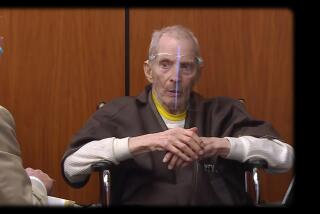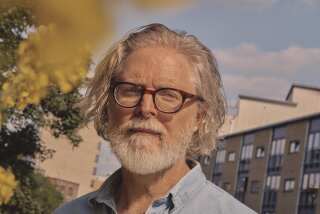Word of Mouth: ‘All Good Things’ cold case makes lawyers hot
- Share via
Reporting from New York — — Andrew Jarecki has identity issues: Wherever the entrepreneur-turned-filmmaker points his cameras, he unearths people acting as if they were someone else.
In his Oscar-nominated debut, 2003’s “Capturing the Friedmans,” Jarecki examined a well-liked teacher leading a terrifying double life. He produced this year’s “Catfish,” a look at how people can concoct multiple Internet versions of their true selves.
And now Jarecki has directed “All Good Things,” a glimpse into a woman’s unsolved disappearance — and the chameleon-like real estate heir suspected in his wife’s vanishing.
Unlike his first two films, both documentaries, “All Good Things,” opening Dec. 3 in New York and Dec. 10 in Los Angeles, is a scripted drama. But the movie is based on the infamous life and famous family of Robert Durst, a scion of a New York real estate firm that is among Manhattan’s most prominent developers.
Although the names of the protagonists have been changed in the film, the Durst Organization has threatened to sue Jarecki and the film’s distributor, Magnolia Pictures, over the company’s depiction in “All Good Things,” one of several challenges Jarecki has faced bringing the story to the screen.
Durst’s 29-year-old wife, Kathleen, was last seen in early 1982; neither she nor her body was ever found. Her family believes that Durst, who took several days to report her missing, killed her or had her killed. “Absolutely, absolutely,” said Kathleen’s brother, James McCormack, who assisted Jarecki in researching the story. “I truly believe he’s a narcissistic sociopath.”
Durst was never charged. Nearly two decades later, a friend of Durst’s, Susan Berman, was killed in Los Angeles in 2000 just before she was to talk to police about Kathleen’s disappearance. Durst was suspected in that case too, but never charged.
Durst, who had moved to Texas about that time and began dressing like a woman, was arrested in 2001 and charged with murdering and dismembering an elderly neighbor, Morris Black.
After skipping bail and becoming a fugitive, Durst was apprehended. He admitted that he hacked up Black’s corpse but said he had killed the 71-year-old in self-defense. He was acquitted of murder, but convicted of improper disposal of a body and served nearly three years behind bars.
Jarecki said Durst was asked to cooperate in the film’s making but did not. “It’s Hollywood fiction,” Dick DeGuerin, a lawyer for Durst, said in an e-mail this week.
Jarecki said that he didn’t want to tell the story as a documentary, believing that narrative inventions (the screenplay is credited to Marc Smerling and Marcus Hinchey) would enable audiences to better understand Durst and his relationships with his wife and father.
“We just thought that unless the core of the documentary is going to be Bob Durst talking, it’s going to be more interesting for us to speculate — to interpolate a story that I think is going to be closer to the human story of what really happened,” Jarecki said. “Are we trying to reproduce a real person? Or create the most real character that Ryan [Gosling] can portray?”
“All Good Things” stars Gosling as David Marks, as Durst is called in the film. He’s clearly reluctant to join the real estate business, although while attending to a problem at one of his family’s apartments, he does meet Katie McCarthy ( Kirsten Dunst). They come from opposite circumstances, and their differences prove magnetic. David and Katie marry and try to establish a low-key life in Vermont, where they open a health-food store called All Good Things. Their happiness is fleeting.
David’s imperious father, Sanford ( Frank Langella, playing a character based on Seymour Durst) presses his son to return to the family business and tries to drive the couple apart — “She’s never going to be one of us,” Sanford says. David is soon collecting rent money from tenants of the family’s Times Square properties, some of which are dens of prostitution. David, traumatized by his mother’s suicide during his childhood, becomes increasingly abusive toward Katie.
Just as she is about to finish medical school — and thus become much more independent — Katie vanishes. Although the movie doesn’t say so explicitly, “All Good Things” strongly hints that David was responsible for her disappearance. Jarecki is even less equivocal about Robert Durst’s role in the fatal shooting of Berman (called Deborah Lehrman in the film) and suggests that the death of Black (called Melvin Bump in the movie) was scarcely an accident.
“I am always fascinated by stories that use epithets: ‘crazy,’ ‘madman,’ ‘twisted,’ ” said Jarecki, who became a filmmaker after selling his ticketing site Moviefone to America Online for about $400 million in 1999. “That’s an opportunity to figure out the person behind the epithet. … We put people in these boxes, and say, ‘Well, this person is crazy.’ But a lot of the time we do that because we want to think that the people who do these extreme things have nothing to do with us.”
As dysfunctional as the father-son story in “All Good Things” might be, Jarecki said, “We can all look at their relationship and say that it has something to do with someone in my family.” In the case of Durst, Jarecki said, “I have always been interested in trying to understand how this kind of extreme behavior could begin.”
In an attempt to figure that out, Jarecki and a team of researchers spent months digging up information about Durst and his family, filling several binders. One key find: recordings of Durst testimony in the Black murder trial, which Gosling listened to and portions of which the actor reads as voiceover.
Jarecki at one point outfitted Gosling with a prosthetic nose that made him look more like Durst, but ultimately ditched the fake. “It didn’t feel right,” he said. “It felt like we were trying to imitate Robert Durst.” Just as filming was set to commence, Jarecki said, he changed the names of the film’s main characters, abandoning the Durst name.
“We thought that it would be more fair if we weren’t putting words directly into the mouths of people with real names,” Jarecki said. “We didn’t necessarily want every article to say ‘Let’s first talk about the Durst case.’” By changing names, the director said, “It would give us the greatest freedom to think and invent things.... We didn’t change the names to make the Dursts happy.”
And the Durst Organization is not happy. Even though Seymour Durst died in 1995, the company says a screenplay for the film is “false, inaccurate, and defamatory” and “casts false and damaging aspersions on the honesty, ethics and good business character” of the business. In letters to Jarecki’s talent agent and Magnolia, a lawyer for the real estate firm said it will sue if the film is released. The Durst Organization declined further comment.
Said Jarecki: “The film is not defamatory in any way.”
Even without the Durst Organization threats, “All Good Things” faced a tough road on the way to theaters. While Jarecki was in the midst of editing the film in the spring of 2009, his wife suffered a serious brain aneurysm (she has since recovered). Then, the Weinstein Co., which was set to release the movie a year ago, lost confidence in “All Good Things” and tried recutting it.
Jarecki bought back the movie from Weinstein this year, and Magnolia, which released “Capturing the Friedmans,” came on board.
James McCormack says he hopes the film might help stir up interest in his sister’s disappearance, and maybe bring her killer to justice. “The more I see it,” McCormack said of the movie he’s watched four times, “the more I see my sister brought to life.”
More to Read
Only good movies
Get the Indie Focus newsletter, Mark Olsen's weekly guide to the world of cinema.
You may occasionally receive promotional content from the Los Angeles Times.











